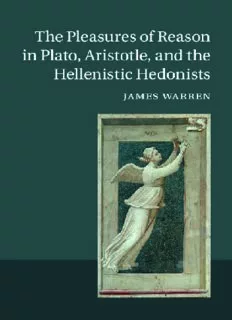
The Pleasures of Reason in Plato, Aristotle, and the Hellenistic Hedonists PDF
Preview The Pleasures of Reason in Plato, Aristotle, and the Hellenistic Hedonists
THE PLEASURES OF REASON IN PLATO, ARISTOTLE, AND THE HELLENISTIC HEDONISTS Humanlivesarefullofpleasuresandpains.Andhumansarecreatures thatareabletothink:tolearn,understand,rememberandrecall,plan andanticipate.Ancientphilosopherswereinterestedinbothofthese facts and, what is more, were interested in how these two facts are related to one another. There appear to be, after all, pleasures and painsassociatedwithlearningand inquiring, recollectingand antici- pating. We enjoy finding something out. We are pained to discover thatabeliefweholdisfalse.Wecanthinkbackandenjoyorbeupset by recalling past events. And we can plan for and enjoy imagining pleasures yet to come. This book is about what Plato, Aristotle, the Epicureans, and the Cyrenaics had to say about these relationships betweenpleasureandreason. jameswarrenisaReaderinAncientPhilosophyattheUniversityof CambridgeandaFellowofCorpusChristiCollege.Heistheauthorof EpicurusandDemocriteanEthics(2002),FacingDeath:Epicurusandhis Critics(2004),andPresocratics(2007),andtheeditorofTheCambridge Companion to Epicureanism (2009) and, with Frisbee Sheffield, The Routledge Companion to Ancient Philosophy (2014). He has published articlesonawiderangeoftopicsinancientphilosophy. THE PLEASURES OF REASON IN PLATO, ARISTOTLE, AND THE HELLENISTIC HEDONISTS JAMES WARREN UniversityPrintingHouse,Cambridgecb28bs,UnitedKingdom CambridgeUniversityPressispartoftheUniversityofCambridge. ItfurtherstheUniversity’smissionbydisseminatingknowledgeinthepursuitof education,learningandresearchatthehighestinternationallevelsofexcellence. www.cambridge.org Informationonthistitle:www.cambridge.org/9781107025448 ©JamesWarren2014 Thispublicationisincopyright.Subjecttostatutoryexception andtotheprovisionsofrelevantcollectivelicensingagreements, noreproductionofanypartmaytakeplacewithoutthewritten permissionofCambridgeUniversityPress. Firstpublished2014 PrintedintheUnitedKingdombyClays,StIvesplc AcataloguerecordforthispublicationisavailablefromtheBritishLibrary LibraryofCongressCataloguinginPublicationdata Warren,James,1974– ThepleasuresofreasoninPlato,Aristotle,andtheHellenistichedonists/JamesWarren. pages cm Includesbibliographicalreferencesandindex. isbn978-1-107-02544-8 1. Plato. 2. Aristotle. 3. Epicureans(Greek philosophy) 4. Pleasure. 5. Reason. 6. Learning. I. Title. b398.p56w37 2014 180–dc23 2014018779 isbn978-1-107-02544-8Hardback CambridgeUniversityPresshasnoresponsibilityforthepersistenceoraccuracyof urlsforexternalorthird-partyinternetwebsitesreferredtointhispublication, anddoesnotguaranteethatanycontentonsuchwebsitesis,orwillremain, accurateorappropriate. For Dad, in memory of Mum ἡδὺ πανταχόθεν ἡ φίλου μνήμη τεθνηκότος . 1105e Epicurus in Plutarch, Non Posse Contents Acknowledgements page ix Listofabbreviations x 1 Introduction:thepleasuresofreason 1 Pleasureandlogismos 1 Knowingandlearning 4 Planningahead 6 Rememberingandanticipating 7 Reasonandemotion 9 Whatthelionanticipates 11 Damasciusandthedonkey 19 2 Platoonthepleasuresandpainsofknowing 21 PleasuresandpainsoflearninginthePhilebus 23 Thepleasuresandpainsofthecave 29 Coming-to-knowandcontinuingtoknow 32 Resolvingthedifficulty 37 Aproposal 46 Philebus55a:pleasure,thought,andthedivinelife 50 3 Aristotleonthepleasuresoflearningandknowing 52 Anaturaldesiretoknow 53 PleasuresofthoughtintheNicomacheanEthics 57 LearningandpleasureinRhetoric1.11 67 LearningandpleasureinPoetics4 71 Conclusions 77 4 EpicurusandPlutarchonpleasureandhumannature 79 Epicureansonthepleasuresoflearningandknowing 79 EpicureansagainstPlato,PlatonistsagainstEpicurus 83 Plutarch’sPlatonistattackonEpicureanpleasures 86 Plutarchandthepleasuresofreason 95 Conclusions 102 vii viii Contents 5 MeasuringfuturepleasuresinPlato’sProtagorasandPhilebus 104 Weighingandmeasuring 105 Measurement,illusion,andprudentialism 111 Thesalvationoflife 116 Philebus41e–42c 119 Conclusions 127 6 Anticipation,character,andpietyinPlato’sPhilebus 129 Anticipationandfalsepleasure 129 Trueandfalsepleasuresandpiety 136 Theunityofalife 140 Characterandfalsepleasure 145 Protagoreanhedonismandconsistency 151 Conclusions 154 7 Aristotleonthepleasuresandpainsofmemory 157 Memory,character,andpleasureintheNicomacheanEthics 157 Memoryandphantasia 163 ThememoriesofEumaeus 168 8 EpicureansandCyrenaicsonanticipatingandrecollecting pleasures 175 Epicureanprudentialreasoning 175 Thelimitsofprudentialreasoning 186 Epicureansandtheircriticsonmemory,anticipation,andpleasure 196 Cyrenaicrecommendations 201 Thepleasuresofconfidentexpectation 204 Conclusions 207 9 Epilogue 210 References 213 Indexlocorum 225 Subjectindex 233
Description: